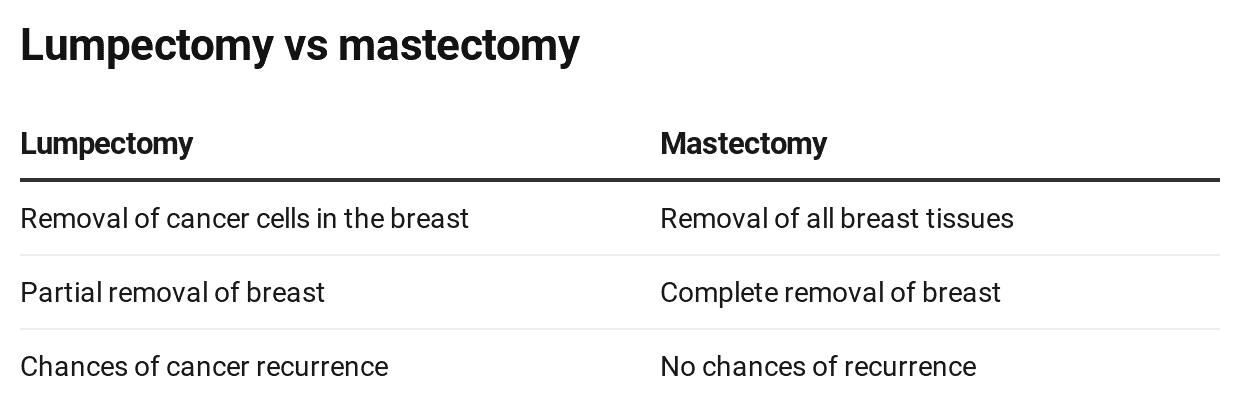
“Cancer is a word, not a sentence”
Nearly 1 in 8 women (13%) will be diagnosed with invasive breast cancer in their lifetime. It can be appalling to receive a breast cancer diagnosis and be that one woman. However, the constant progress of medical science offers hope at times of distress. Patients are faced with breast cancer treatment options almost immediately after they discover this ailment. It is, especially, ordinary for patients with early-stage cancer to have a choice of treatment.
While having a range of treatment options is great, it can also be stressful to make the best choice. Early-stage breast cancer patients face the dilemma of choosing between lumpectomy vs mastectomy.
This article explores the difference between lumpectomy and mastectomy.
Table of Contents
The objective of a breast cancer treatment is to remove the cancerous cells from the body and stop them from spreading further. There are several different types of treatment modalities for breast cancer.
Breast cancer treatment is mostly offered by combining more than one methods. Lumpectomy or mastectomy are also used in conjunction with other measures such as radiation therapy, chemotherapy, breast reconstruction surgery and more.
Lumpectomy vs mastectomy for breast cancer are surgical procedures aimed at removing cancer cells from the breast. They are both effective for specific patients.
Lumpectomy: Lumpectomy surgery is a type of breast-conserving surgery. In this procedure, your breast cancer surgeon removes the tumour inside your breast. Along with tumour, he/she also removes some amount of surrounding healthy tissues to stop the spread of cancer.
In most cases, radiation therapy is also offered after lumpectomy to prevent recurrence of the disease.
Mastectomy: Mastectomy is the surgical removal of the entire breast for the management of cancer. This procedure is further categorised into five types –
Several medical factors contribute to deciding the most suitable breast cancer treatment. The size and location of the tumour, your overall health, your medical history, family history of the disease and age are some determinants that doctors take into account.
However, personal reasons are also regarded when treatment is being sought for early stages of breast cancer.
Here is what you should consider if you are perplexed on how to decide between lumpectomy or mastectomy:
Lumpectomy and mastectomy surgery are both safe procedures. However, certain risks and complications are associated with these surgeries. Some of the common side-effects include pain, the chance of infection, bleeding and more.
If you choose to undergo lumpectomy, your healthcare provider will suggest you have radiation therapy for the completion of treatment. Radiation therapy has added side-effects that are likely to impact your general health. These include fatigue, damage to surrounding tissues, low white blood cell count, skin problems such as redness, itchiness etc.
While lumpectomy provides you with a way to preserve your breast partially, it also allows for a chance of cancer recurrence. Cancer cells may occur again in the breast after a lumpectomy. In such a rare case of recurrence, you may need another course of breast cancer treatment.
On the other hand, mastectomy surgery provides full and final relief from cancer in the breast with almost no chance of recurrence. In a post mastectomy care, you would also not need any other procedures as it offers maximum benefits alone.
The overall recovery period and care after lumpectomy or mastectomy are unique for each patient. It depends upon factors such as the stage of cancer, your general wellbeing, age and more. Your recovery may be lengthier based on the additional treatments you have.
Besides the medical prerequisites, you can choose between lumpectomy and mastectomy for breast cancer based on their effect on your appearance.
Mastectomy surgery is the process in which breast is completely removed. Breasts are often an important aspect of a woman’s identity and a complete absence of breast can impact her psychologically and emotionally. You can choose to have a breast reconstruction surgery after mastectomy. Nonetheless, this surgery also has its particular medical necessities and expenses.
While you can choose to have breast reconstruction post care after lumpectomy, the possibilities of the same become limited. It is because radiation therapy after lumpectomy affects the timing and options of reconstruction.

Questions to ask yourself on lumpectomy or mastectomy how to decide
If you have the choice to decide between lumpectomy and mastectomy, you should think through your options. Ask yourself:
Breast cancer treatment options should only give you hope and not anxiety. By learning more about your choices, you can make an informed decision. You should note that your personal preferences will be kept secondary to medical necessities. The primary objective is to get rid of cancer cells as safely and permanently as possible.
For more information on lumpectomy and mastectomy for breast cancer treatment, visit our world-class breast centre at the CK Birla Hospital.
Book an appointment with Dr Rohan Khandelwal for personalised guidance on breast health.
Ques: Is it better to have a mastectomy than a lumpectomy?
Ans: Mastectomy and lumpectomy are both effective breast cancer treatment measures. The appropriate surgery depends upon the health of the patient & size and location of cancer.
Ques: What stage of breast cancer requires a mastectomy?
Ans: Breast cancer, detected in early stage, can be treated effectively with mastectomy. On average, mastectomy is suited for stage II breast cancers.
Ques: What stage of breast cancer requires a lumpectomy?
Ans: Similar to mastectomy, lumpectomy surgery is also performed on a patient with stage II cancer. However, other factors such as the severity of symptoms, patient’s age and health are taken into regard.
Ques: Can I lay flat after a mastectomy?
Ans: Yes, after breast cancer surgery, a patient is asked to remain on her back until healed enough to lay sideways. However, since each patient is unique, your breast surgeon will offer you specific guidelines.